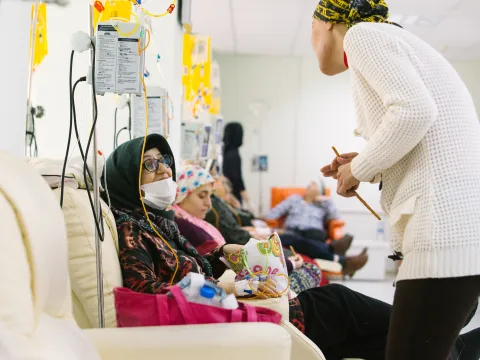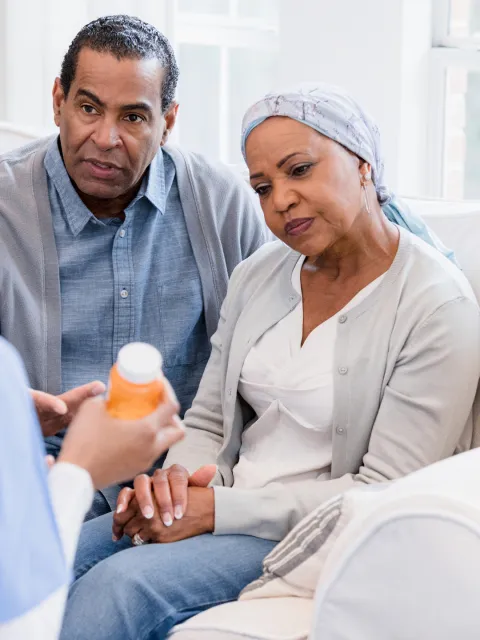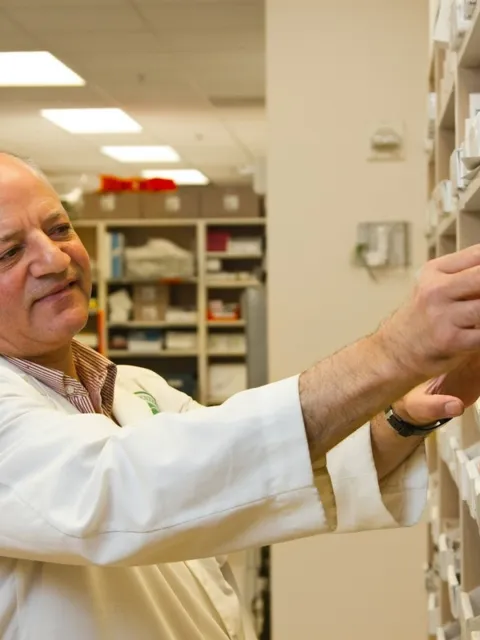Podcast "Let's Talk Cancer" – Antimicrobial resistance is a threat to cancer patients worldwide

Antimicrobial resistance, also known as AMR or drug resistance, is among the top 10 public health threats facing humanity, according to the World Health Organization.
Antimicrobial resistance happens when the medicines, including antiotics, are no longer able to fight infections from bacteria, fungi, viruses and parasites.
For cancer patients, the situation is particularly concerning. They have particularly weak immune systems due to the cancer treatment, such as chemotherapy, they are receiving and are therefore more prone to infections. As many as 1 in 5 cancer patients undergoing treatment are hospitalised due to infection. Antibiotics are critical to treat them.
Moreover, the growth of drug-resistant bacteria is undermining the key advances that have been made in surgery, radiotherapy and immunotherapies, as treatment is delayed or stopped to treat rising infections.
Malin Grape is Sweden’s – and the world’s – first Ambassador on AMR, working to counteract AMR and its consequences in the EU and internationally.
See podcast transcript below
Listen on: Spotify | Stitcher | Apple Podcasts | Amazon Music | Audible | Deezer
Podcast transcript
Cary Adams: Welcome to Let's Talk Cancer. My name is Cary Adams, and I'm the CEO of the Union for International Cancer Control. Antimicrobial resistance, also known as AMR or drug resistance, is among the top ten public health threats facing humanity, according to the World Health Organisation. Antimicrobial resistance happens when the medicines, including antibiotics, are no longer able to fight infections from bacteria, fungi, viruses and parasites. For cancer patients, the situation is particularly concerning. They have weak immune systems due to the cancer treatment such as chemotherapy. As many as 1 in 5 cancer patients undergoing treatment are hospitalised due to infection. Antibiotics are critical to treat them. Moreover, the growth of drug resistant bacteria is undermining the key advances that have been made in surgery, radiotherapy and immunotherapies as treatment is delayed or stopped to treat rising infections. Malin Grape is Sweden's and the world's first ambassador on AMR, working to counteract AMR and its consequences in the EU and internationally. She joins us for this episode of Let's Talk Cancer. Ahead of the upcoming UN high level meeting on AMR. Malin, thank you very much for joining us today.
Malin Grape: Thank you. It's my pleasure. I'm so glad to be invited.
Cary Adams: What is the current situation with AMR from your perspective? Is it as alarming as it's being portrayed?
Malin Grape: It is alarming, absolutely. And I don't think many people know this, but the I mean, the trend is only going in the wrong direction. We see increasing resistance development all the time around the world. In 2019, as much as 1.3 million people died as a direct effect of resistance to the treatment that they got for their infections, their bacterial infections. And this is to I mean, relate these figures to something. This is more than than people dying from Aids and malaria. So it is not only a future threat, but it's really a current ongoing, huge threat to to global health. Of these 1.3 million people who died from from bacterial resistance to antibiotics, as many as 1 in 5 were in sub-Saharan Africa and 1 in 5 were also in children under five. So it's also very obvious as often, of course, that this is something that that hits the most vulnerable, the hardest.
Cary Adams: And the most vulnerable clearly includes cancer patients who we know are particularly affected by this. What's your perspective on AMR and cancer?
Malin Grape: As you say, the cancer patients are particularly vulnerable because of the the effects that that cancer treatment has on on the immune system. So it's a particularly vulnerable group. And it's for this type of of situations and patients that we really need to save our antibiotics and make sure that they continue working to be able to both prevent and treat severe infections in vulnerable patients. And we know that as, as many as almost 20% of of cancer patients under treatment are hospitalised because of infections, we have a higher risk. We already have higher prevalence of resistant bacteria in cancer patients. So I think this is really something that needs to be taken account when treating cancer patients and how to both prevent and also select the treatment for these patients. But I mean, again, we have many vulnerable groups, as you say, we we also take at least in many parts of the world, we take this, this type of advanced treatments for granted? When you get cancer, you expect to have treatment. When you break something, you you expect to be able to get surgery. For example, in our part of the world we have access to transplants, for example. And all of these, I mean, advanced medical progress that we made the last decades is essentially dependent on the possibility to both prevent and treat infections. And in addition to this, also the really basic medicines. Treating children with pneumonia in other parts of the world is dependent on having access to effective antibiotics. Caesarian sections is another really good example I think so. So it's really our entire health systems are dependent on antibiotics that are working and that we can rely on them to work.
Cary Adams: We are definitely a generation that really hasn't known a world without antibiotics and the ability to address the challenges of bacteria, infection, etc.. We have been working diligently the last couple of years to raise the profile of AMR across the cancer community, but it's still it's still difficult sometimes because it feels like it's a problem of the future rather than a problem for today. what what do you feel works in terms of really getting people to understand the urgency of the situation?
Malin Grape: I think that's a very good question. And I wish I had like the best answer because then we could just implement. But I think it is very much as you say, it's it's not well understood. It's seen as maybe something, you know, a bit gloomy, quite vague threat of the future. I think it's also about the terminology and the narrative. We talk about an acronym. How do you get people engaged in armour. You know, word that you don't even know what it means. And if you explain antimicrobial resistance, it doesn't really make people feel more engaged or or, uh, make them understand. So. So I think it's, we really need to be careful when we talk about this, and I think we should maybe, turn more towards talking about infections because everybody knows infections and everybody knows that they can be really severe if we can't treat them in the right way. so I think it's very much about the narrative, but also making people feel engaged. This is something I mean, we are all at risk of contracting and untreatable infection. I think there is a lot still a lot of misconceptions, for example, when it comes to resistance, people who haven't taken antibiotics very much themselves, they they think they can't, you know, be at risk. But it's not you that become resistant. It is the bacteria that spread between people. So it doesn't matter. Your behaviour only matters for the greater. I mean, for for the collective. So I think, you know, all these aspects of it need to be better understood. Everybody knows about cancer. Everybody's probably touched by cancer in one way or the other. But if you had a resistant infections, you don't talk about it. You might not even know yourself whether the the infection that you got were susceptible to the treatment that the doctor would have selected, or if they had to choose something else because of resistance, for example. It's not something we talk about, so we need to do much more on that and increase the understanding that this is this is something that that engages and concerns us all.
Cary Adams: As you said earlier, 20% of cancer patients are likely to be hospitalised through an infection. So it is something that the cancer community is aware of. and I know that when we first introduced ourselves to the AMR community, they were really pleased that a patient group was interested in banging the drum about the importance of AMR. And and we relish that because we think it is important. do you feel that the cancer community has a could have a very strong voice in arguing for action against AMR?
Malin Grape: Absolutely. And I must say that I'm really grateful for all the work that you've been doing already until now. And I think you can absolutely be such an important voice for this issue, and especially since it is something that that affects cancer patients. but I think very often, as we talked about before, it's we miss this. We miss these stories. We miss this faces of resistance. Because it's not one disease. We don't have a patient group of patients that were affected by by resistant infections because it can mean so many different things for different people. So I really very much believe in cancer society. And of course, also having the cancer Society may be engaging other civil society organisations and other patient organisations that are affected in different ways.
Cary Adams: What is it that governments can do, policy makers can do with regard to AMR? what are the actions that they can take within their own countries?
Malin Grape: There is a lot we can do. I mean, we must remember that that, even though resistance is a natural phenomenon, it's the defence of the bacteria. Since penicillin and other antibiotics are natural substances. Bacteria develop this resistance so that that is, you know, it can't be avoided. But it is the misuse and the overuse of people that put us into this situation where we really run a risk of of running out of alternatives. So it's also humans that need to make sure to do everything to to counteract this development. And we must do a lot of things at the same time, there is not just one solution. We need to use antibiotics more responsibly. And I think that is what people normally come to think of. First. When we talk about antibiotic resistance, we need to stop all the unnecessary use. And that is both in humans and animals and even in agriculture.
Cary Adams: Malin, you mentioned agriculture and the use of antibiotics in agriculture. Why is that an issue?
Malin Grape: It is an issue because globally, much more antibiotics are actually used to animals than to humans, and these are not very often not even sick animals. So they are not used for treatment, but they are used for preventive purposes. But that is very often instead of keeping a very high level of hygiene and biosecurity. So it's easier and cheaper to give your animals antibiotics. In some parts of the world, antibiotics are also still used for growth promotion, for actually having these animals growing quicker and going quicker to slaughter. And that is, of course, absolutely not a correct and responsible use of antibiotics. There are also parts of the world where antibiotics are used on plants. And same here. It's it's very often not a responsible use at all.
Cary Adams: And presumably the resistance is passed through the food chain. Is it.
Malin Grape: The antibiotics will not be in the food that you eat. You will not have meat, for example, with antibiotics in them. Uh, but the the, the microbes, the bacteria that might come together with the food, uh, are, of course, at risk of, of of being resistant. The important thing here is the precautionary principle that we should only use antibiotics when they are necessary and when they are helping sick people or sick animals. We also need to do much more when it comes to preventing resistance. We need to prevent spread of resistant bacteria, spread of resistant infections, but also spread of infections that might need to be treated with antibiotics. In some parts of the world. Focus a lot of on clean water, sanitation, our part of the world, maybe more on on hospital hygiene, for example, because hospitals are really the environment where these resistant bacteria strive. They have a lot of susceptible patients there. There's a lot of antibiotics used which gives this resistant bacteria this comparative advance. Prevention is really a big thing. And of course also through vaccination, for example, and in the society by by keeping some of the lessons learned, for example, from the Covid 19 pandemic, not to not to go to work when you you're sick, for example, wash your hands, make sure that you don't disseminate diseases.
Cary Adams: One of the phrases that we learnt well, we heard a lot when we started to work with the AMR community was this question of antibiotic stewardship? now I think you've covered some elements of that in your last question, but what is antibiotic stewardship?
Malin Grape: It's really about using antibiotics responsibly. and this goes for I mean, sometimes it goes for, for the public. We know that some people and in some parts of the world, you can buy antibiotics without a prescription, for example, and take them whenever you feel that it might be useful. And and that is of course, that is not responsible use. You can't know whether you have an infection that needs to be treated with antibiotics. And if you do, you can't know which type you should use. So it's not only about the amount of use, but it's also stewardship is also about choosing the right antibiotics in the right dose during the right length of time to the right patient. and I think we also there is there is a general, I think, overreliance in antibiotics very often with the less severe infections. You could also wait and see. I think we very often think that, oh, now I have this tonsillitis and I really need to take antibiotics to get better as soon as possible, but you might gain maybe half a day. One day, uh, by taking antibiotics while I mean, it also has has side effects, not only the the resistance development, but also you can get side effects when it comes to your gut, for example, and so on. So so it's you should really also consider whether antibiotics are necessary.
Cary Adams: We are having this chat because we are heading towards a United Nations high level meeting on AMR. I think this is the second meeting on that subject. So clearly an important meeting for the world's leaders to come together and discuss the challenges which you've outlined so beautifully. What do you think should be the specific asks of countries around the world when they attend that meeting?
Malin Grape: The meeting is absolutely important. And as you say, it's the second one. We had the first 1 in 2016. It's quite a long time ago. A lot has happened since then, and in my perspective, it's a little long with eight years between these two. Uh, but I think that, you know, the meeting is one thing. Now, we are actually currently negotiating the political declaration that we hope to be adopted at the meeting. But I think that this, this time around, both before and after this meeting, are just as important. It's not it's not the meeting and the declaration itself, but it's really this time to advocate and raise the awareness on this issue and raise both political but also public awareness on this. And that, of course, needs to continue. But when it comes to the meeting itself, what we are engaging very much in and prioritising from Sweden is to see more to happen on the ground in the countries and to support that, we also need some more overarching structures and architecture at the global level to support the countries and to make sure that there is accountability, that there is funding for those who need that. so we wish to see commitments both both for the actual implementation on the ground, which I think is most important, but also on the global level for for more responsibility and for accelerating this.
Cary Adams: One of the things that UIC will be pressing for is obviously mention of cancer as a critical issue with regard to AMR within what they call the outcomes document from these meetings. But then the follow up to make sure that countries include AMR in their national cancer control plans, the appropriate use, as we discussed earlier, you know, the antibiotic stewardship whilst treating cancer patients. So we're ready to take it forward afterwards. What else can be done? Do you think at a national level, do you think there should be national AMR plans? Are there such things?
Malin Grape: There are in many countries national action plans on AMR. And this was actually a commitment already in the last 2016 meeting that all countries should develop plans. Now, having a plan doesn't really mean that anything changes. And this is what we see now in many parts of the world. There are plans, but there are no allocated specific funding for the implementation of these plans. And we don't see that the plans are really implemented in some countries. We also see that these plans might not be very country specific, and you haven't really done the entire homework of of looking at the context, looking at the countries needs, and make the necessary priorities. So this is absolutely something I think is is one of the most important things to have both funding, but also a structure for implementing these plans and what we would suggest and hope to also see in this political declaration is a commitment from the countries to set national targets. They could be. I mean, they should be country specific and they could be as ambitious as a country can, you know, in the first steps, set them. but that would also mean, I think, a lot for the continued work, because if you set targets, you need to set up a system to follow up your progress towards these targets, and you need to make the necessary priorities. Where should you start? What is the most important right now for us to achieve these targets? So even though we talk a lot about also global targets, which I'm I'm very much in favour of, I think it's it's a useful and very powerful tool when it comes to raising awareness and assuring progress. I think for the for the actual impact in countries, I would really like to see national targets being set as.
Cary Adams: A key component of success in the future is a pipeline of new antibiotics antifungals. I attended a meeting in Basel this year and it was quite a distressing meeting, hearing from so many bright, brilliant people who've got great ideas and trying to find capital to get their their ideas out there and their new products and their medicines out there. It seemed that the business model was broken for new, new solutions. Is that something that you think a high level meeting can address, or is that something that needs to be addressed differently?
Malin Grape: It is part of of the high level meeting. Absolutely. I mean, as you say, the system is broken. This this is something that we need to invest a lot of funds in, something that we then don't wish to be used. So it's you have to find other ways of incentivising the development and marketing of antibiotics. We don't want to continue paying for the actual volumes and the level of of prices being set, but we need to pay in a different way for, for these treatments. I just want to go back also because you talk about these, these brilliant people and the brilliant ideas out there, and there are a lot. But I would also say that, it's not only the funds that are missing, it's really also the the research environment has, has suffered a lot from this as well. Many of the, the researchers with the long experience within this field have has have left it because there is no there is no money in it. And that's why I think we need to really take an end to end approach. It's the funding. But there's also a need for a lot of other types of support when it comes to developing new treatments. And that goes, for example, to to clinical studies for regulatory advice, for the small research groups and small and medium enterprises to to scale up.
Cary Adams: It's interesting with antibiotics and antifungals that you want a supply of them, but at the same time you don't want to use them. Now that's not a very good business proposition to a company. So are there any innovative ways that you're aware of where we can bridge that gap between the need of the company to get volume to justify their investment, but at the same time to protect the use of those particular antibiotics?
Malin Grape: It's not profitable. We will try to limit the use and the sales of these. And if you only then get your profit from from the price and the volume, it will never really be worth it. So so we need to find other ways and delinking the price and volume from the price paid. And there are some some different suggested ways of, of incentivising development of new antibiotics in Sweden. We have a pilot tested and are now using a model for paying for access to antibiotics. specific essential antibiotics that we have prioritised. and then having this delinkage, we pay a fixed amount given a reimbursement, a revenue guarantee for the companies that go into these contracts regardless of how much is used. this is of course it doesn't. It doesn't make so much of a difference in if we only do it in Sweden. But we need to find ways of, of using these models on a global level in the countries that can afford to pay for this and, and should take the responsibility to pay for development of new antibiotics in in the UK. There is also a similar subscription model, which is used to to incentivise also development and marketing of new antibiotics, and there are several examples now of pilots. For example, both Canada and Japan are piloting their models and there are discussions ongoing also at the EU level. So with more, if, for example, the G7 could come together and do this and also make sure that we have criteria that are similar enough to assure predictability for pharma industry, that would make a huge difference for for the willingness to invest in research and development of new antibiotics. And in addition to this, and that goes for both these possible new treatments, but also existing antibiotics, we need to do much more to also make these drugs accessible when they are needed, because in many parts of the world, more people still die from not having access to antibiotics than because of resistance to these drugs.
Cary Adams: I've met you a few times now, Malin. You're always so optimistic. Are you optimistic about the high level meeting and the outcomes and the progress that we can make in that next five year timeline that you've set out?
Malin Grape: I am optimistic, I think that's I have to be. When I'm in this area and I believe in I believe in people. I believe in people's engagement and commitments. So yes, I'm optimistic. Of course, I understand that the expectations from parts of the EMR society are quite different from the expectations from from the diplomats in New York. If I may say so. I hear there's a huge gap there. but given the situation in the world we have moved forward, there is much more awareness and understanding of this, and I'm sure that we can can actually make commitments and come to agreements on several parts of this. But again, it's not we will not solve everything. Now, this is one step on a very long way. So yes, I think we will achieve some new commitments. We will see things in this outcome document that weren't there before that, that haven't been really agreed in the same way before. And that's what we then have to work with and continue to work with.
Cary Adams: Thank you very much, Malin, and I will see you at the high level meeting.
Malin Grape: Absolutely. And thank you so much to the Uicc for all your support and your engagement in this, in this work that we do. Thank you so much.
Cary Adams: If you're interested in antimicrobial resistance, visit our dedicated webpage on uicc.org, under What We Do, where you will find articles, blogs and a previous podcast on AMR. Thank you for listening.
Last update
Friday 27 September 2024




